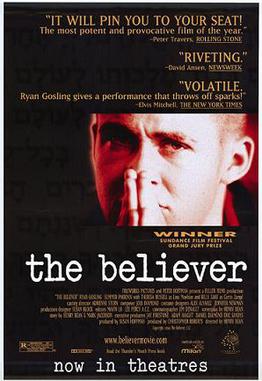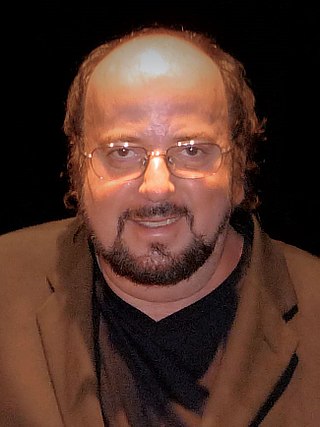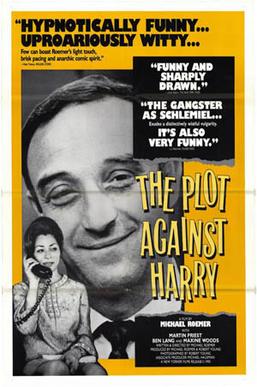Related Research Articles

Nothing but a Man is a 1964 American independent drama film starring Ivan Dixon and Abbey Lincoln, and directed by Michael Roemer, who also co-wrote the film with Robert M. Young. The film tells the story of Duff Anderson, an African-American railroad worker in the early 1960s who tries to maintain his dignity in a small racist town near Birmingham, Alabama, after he marries the local preacher's daughter. In addition to dealing with oppression and discrimination, Anderson must also come to terms with his troubled relationship with his own father, a drunk who abandoned and rejected him.

The Kindertransport was an organised rescue effort of children from Nazi-controlled territory that took place in 1938–1939 during the nine months prior to the outbreak of the Second World War. The United Kingdom took in nearly 10,000 children, most of them Jewish, from Germany, Austria, Czechoslovakia, Poland, and the Free City of Danzig. The children were placed in British foster homes, hostels, schools, and farms. Often they were the only members of their families who survived the Holocaust. The programme was supported, publicised, and encouraged by the British government, which waived the visa immigration requirements that were not within the ability of the British Jewish community to fulfil. The British government placed no numerical limit on the programme; it was the start of the Second World War that brought it to an end, by which time about 10,000 kindertransport children had been brought to the country.
This is a selected bibliography and other resources for The Holocaust, including prominent primary sources, historical studies, notable survivor accounts and autobiographies, as well as other documentation and further hypotheses.

Philip Davis Guggenheim is an American screenwriter, director, and producer.

The Believer is a 2001 American drama film written and directed by Henry Bean in his feature directorial debut, based on a story by Bean and Mark Jacobson. Starring Ryan Gosling, Billy Zane, Theresa Russell, and Summer Phoenix, the film follows Daniel Balint, a Jew who becomes a neo-Nazi. The film is loosely based on the true story of Dan Burros, a member of the American Nazi Party and the New York branch of the United Klans of America who died by suicide after being revealed as Jewish by a reporter from The New York Times.

Sir Nicholas George Winton was a British stockbroker and humanitarian who helped to rescue refugee children, mostly Jewish, whose families had fled persecution by Nazi Germany. Born to German-Jewish parents who had immigrated to Britain at the beginning of the 20th century, Winton assisted in the rescue of 669 children from Czechoslovakia on the eve of World War II. On a brief visit to Czechoslovakia, he helped compile a list of children in danger and, returning to Britain, he worked to fulfill the legal requirements of bringing the children to Britain and finding homes and sponsors for them. This operation was later known as the Czech Kindertransport.

James Lee Toback is an American screenwriter and film director. He was nominated for the Academy Award for Best Original Screenplay in 1991 for Bugsy. He has directed films including The Pick-up Artist, Two Girls and a Guy and Black and White.

The March of the Living is an annual educational program which brings students from around the world to Poland, where they explore the remnants of the Holocaust. On Holocaust Memorial Day observed in the Jewish calendar, thousands of participants march silently from Auschwitz to Birkenau.
Henry Nemo was an American musician, songwriter, and actor in Hollywood films who had a reputation as a hipster.

Into the Arms of Strangers: Stories of the Kindertransport is a 2000 documentary film about the British rescue operation known as the Kindertransport, which saved the lives of over 10,000 Jewish and other children from Nazi Germany, Austria, Czechoslovakia, and Danzig by transporting them via train, boat, and plane to Great Britain. These children, or Kinder in German, were taken into foster homes and hostels in Britain, expecting eventually to be reunited with their parents. The majority of them never saw their families again. Written and directed by Mark Jonathan Harris, produced by Deborah Oppenheimer, narrated by Judi Dench, and made with the cooperation of the United States Holocaust Memorial Museum, it utilized rare and extensive footage, photographs, and artifacts, and is told in the words of the child survivors, rescuers, parents, and foster parents.

Leslie Baruch Brent was a British immunologist and zoologist. He was Professor Emeritus, University of London, from 1990. An immunologist, he was the co-discoverer, with Peter Medawar and Rupert Billingham, of acquired immunological tolerance. They injected cells from donor mice into fetal mice, and later neonatal mice, which would as adults receive donor skin grafts without rejection.

Hedy Epstein was a German-born Jewish-American political activist and Holocaust survivor known for her support of the Palestinian cause through the International Solidarity Movement.

Stuart Alexander Bunce is an English actor who is best known for his portrayal of the First World War poet Wilfred Owen in the film Regeneration directed by Gillies MacKinnon.

The Plot Against Harry is an American comedy film directed by Michael Roemer. The plot involves Harry Plotnick, a small-time Jewish gangster living in a now largely Hispanic and African American New York neighborhood, playing the numbers game after being released from prison.

Anna Essinger was a German Jewish educator. At the age of 20, she went to finish her education in the United States, where she encountered Quakers and was greatly influenced by their attitudes, adopting them for her own. In 1919, she returned to Germany on a Quaker war relief mission and was asked by her sister, who had founded a children's home, to help establish a school with it. She and her family founded a boarding school, the Landschulheim Herrlingen in 1926, with Anna Essinger as headmistress. In 1933, with the Nazi threat looming and the permission of all the parents, she moved the school and its 66 children, mostly Jewish, to safety in England, re-establishing it as the Bunce Court School. During the war, Essinger established a reception camp for 10,000 German children sent to England on the Kindertransports, taking some of them into the school. After the war, her school took many child survivors of Nazi concentration camps. By the time Essinger closed Bunce Court in 1948, she had taught and cared for over 900 children, most of whom called her Tante ("Aunt") Anna, or TA, for short. She remained in close contact with her former pupils for the rest of her life.

The Bunce Court School was an independent, private boarding school in the village of Otterden, in Kent, England. It was founded in 1933 by Anna Essinger, who had previously founded a boarding school, Landschulheim Herrlingen in the south of Germany, but after the Nazi Party seized power in 1933, she began to see that the school had no future in Germany. She quietly found a new home for the school and received permission from the parents of her pupils, most of whom were Jewish, to bring them to safety in England. The new school was called New Herrlingen School, but came to be known as Bunce Court. The school closed in 1948. Alumni, who sometimes stayed on at the school even after finishing, were devoted to the school and organized reunions for 55 years. They have referred to its "immense effect" on their lives, as "Shangri-La" and to being there as "walking on holy ground".
Peter Morley, OBE was a German-born British television producer and documentary filmmaker. As a nine-year-old child, he fled Nazi Germany with his elder siblings and moved to England, where he lived until his death. He made several documentaries about the Holocaust, winning several awards, both in Britain and abroad.
Hanna Bergas was a German teacher. Fired from her job and prevented from teaching in public schools in Nazi Germany, she found employment at a private boarding school in Blaustein, in southern Germany. In 1939, after she had fled to England, Bergas was part of the group of teachers from Bunce Court School that met the Kindertransports and helped the refugee children adjust to their lives in the new country. After the war, Bergas emigrated a second time, moving to the United States.

Walter Bingham is a German-born British-Israeli journalist, actor, and businessman, as well as a Holocaust survivor and decorated World War II veteran. At age 99 in 2023, Bingham was Israel's oldest working journalist.
References
- 1 2 3 4 5 6 7 Vicki Vasilopoulos, "New Life for a 1964 Film" The New York Times (November 14, 2004). Retrieved October 20, 2011
- 1 2 Janet Maslin, "Children Were Saved, but So Much Was Lost" The New York Times (December 2, 1998). Retrieved October 20, 2011
- ↑ John O'Mahony, "Surfaces and depths" The Guardian (September 15, 2001). Retrieved October 19, 2011
- ↑ Andrew Lambirth, "Master of accretion" [ permanent dead link ] The Spectator (January 2, 2010). Retrieved October 20, 2011
- ↑ Grisar, PJ. "Four decades later, a Jewish iconoclast's searing film gets its debut". Forward. Retrieved 28 November 2024.
- ↑ William H. Smock, "Michael Roemer: Silhouette" The Harvard Crimson (March 4, 1965). Retrieved October 28, 2011
- ↑ "Nan Goldin & Pawel Wojtasik present: Nothing But A Man" Archived 2011-11-16 at the Wayback Machine UnionDocs (UnDo). Retrieved October 19, 2011
- 1 2 Michael Roemer bio Archived 2011-09-15 at the Wayback Machine San Francisco Jewish Film Festival. Retrieved October 28, 2011
- 1 2 Susan King, "MICHAEL ROEMER: Unraveling 'The Plot Against Harry'" Los Angeles Times (May 26, 1991). Retrieved October 19, 2011
- ↑ "Bergamo Film Meeting".
- ↑ Michael Upchurch, "Michael Roemer's `Plot' Sees The Light Of Day Again" The Seattle Times (February 24, 1990). Retrieved October 19, 2011
- ↑ "1971: Creative Arts - Film" John Simon Guggenheim Memorial Foundation. Retrieved October 28, 2011
- ↑ "Michael Roemer". IMDb. Retrieved May 29, 2022.
- ↑ Morris, Wesley (May 27, 2022). "'Vengeance Is Mine' Review: A Tangled Web of Human Impulse". The New York Times. Retrieved May 29, 2022.
- ↑ Hamrah, A.S. (May 24, 2022). "Life Is Hard: Michael Roemer on Vengeance Is Mine". Screen Slate. Retrieved May 29, 2022.
- ↑ "Vengeance is Mine". Film Forum. Retrieved March 29, 2022.